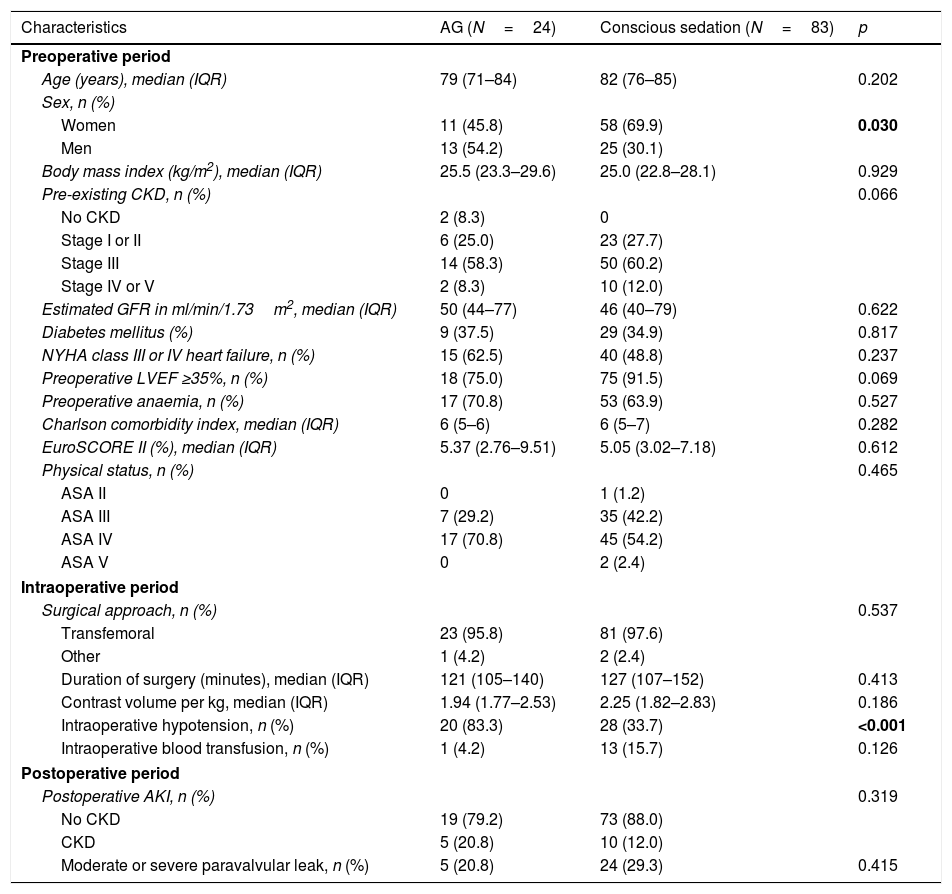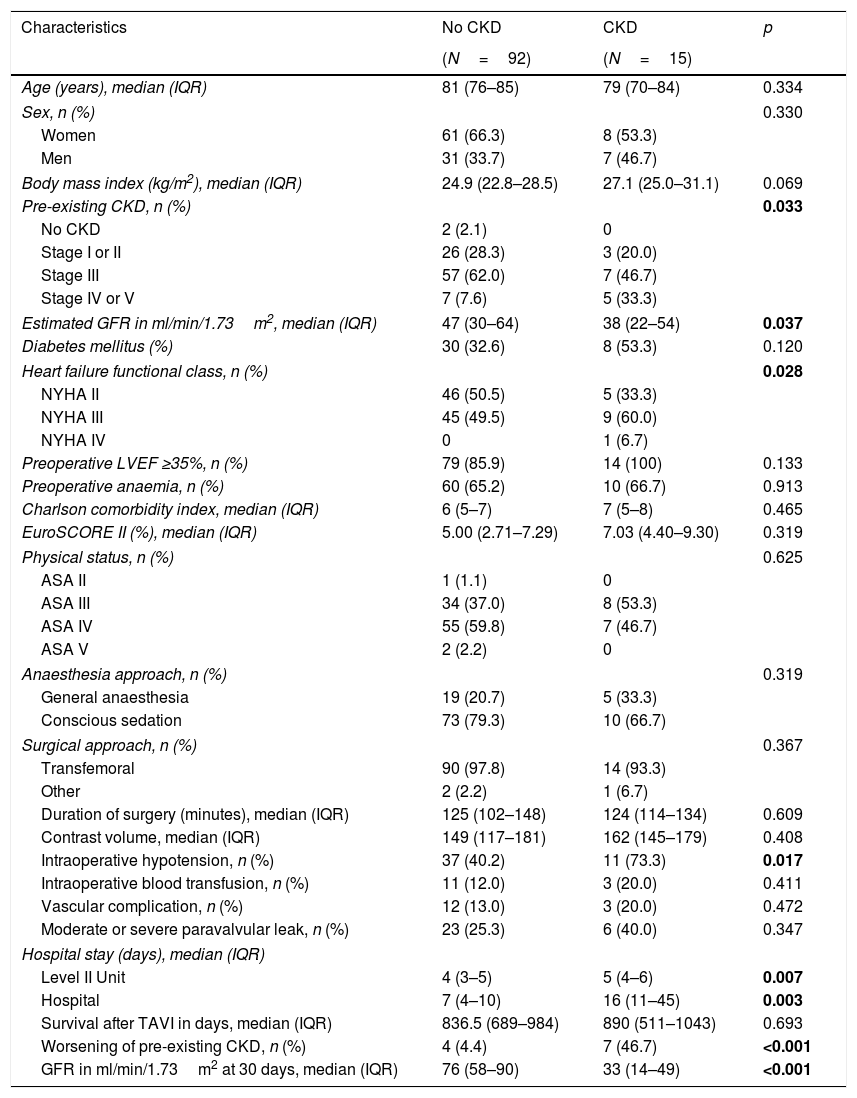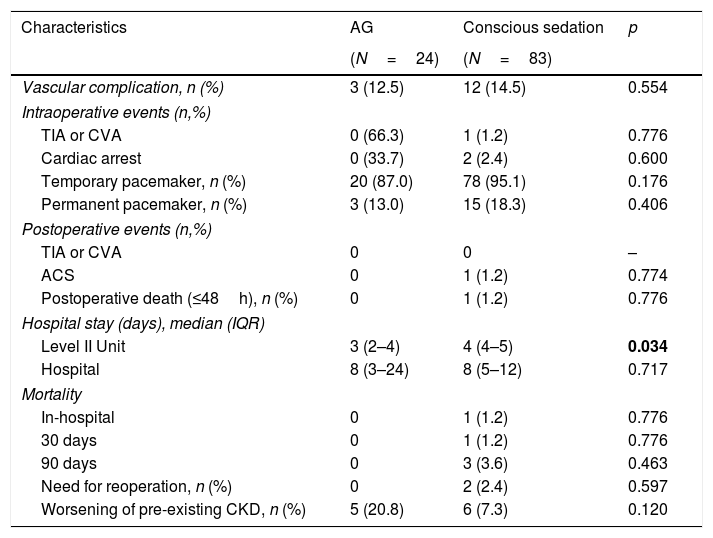Anaesthetic techniques have been reported as having an impact on acute kidney injury (AKI) incidence in the postoperative period in patients undergoing transcatheter aortic valve implantation (TAVI). This study aimed to assess whether exists an association between anaesthetic approach in patients undergoing TAVI and the post-operative AKI incidence. The existence of association between anaesthetic approach and mortality was also assessed.
Materials and methodsA retrospective, single-centre, observational study was conducted at the Centro Hospitalar Universitário de São João, a Portuguese reference centre. All patients undergoing TAVI from January 2015 to June 2018 were recruited and were divided into two groups for analysis: general anaesthesia (GA) and sedation.
ResultsOne hundred and seven patients underwent TAVI (GA: n=24; sedation: n=83) and the overall incidence of AKI was 14.02%. We found a higher incidence of intraoperative hypotension in the GA group (83.3 vs. 33.7%, p<0.001). Regarding postoperative outcomes, there were no significant differences in AKI incidence (20.8 vs. 12.0%, p=0.319) and mortality. A significant association was found between postoperative AKI and preexisting chronic kidney disease (CKD), preoperative heart failure functional class, intraoperative hypotension, longer length of stay in level II unit, longer hospital stay and worsening of previous CKD stage.
ConclusionsIt was not possible to established association between the anaesthetic approach for TAVI procedures and postoperative AKI and mortality. Our study reinforces the importance of preventing AKI incidence, considering its impact on the worsening of baseline CKD and on the length of stay, leading to higher hospitalization costs.
Se ha reportado que las técnicas anestésicas tienen un impacto en la incidencia de la lesión renal aguda (LRA) postoperatoria, en pacientes sometidos a implante de válvula aórtica transcatéter (TAVI). Este estudio tuvo como objetivo evaluar si existe una asociación entre la técnica anestésica en pacientes sometidos a TAVI y la incidencia postoperatoria de LRA. También se evaluó la existencia de asociación entre la técnica anestésica y la mortalidad.
Materiales y métodosSe realizó un estudio observacional retrospectivo en el Centro Hospitalar Universitário de São João, un centro de referencia portugués. Se reclutó a todos los pacientes sometidos a TAVI desde enero de 2015 hasta junio de 2018, dividiéndose en dos grupos para análisis: anestesia general (AG) y sedación.
ResultadosCiento siete pacientes fueron sometidos a TAVI (AG: n=24; sedación: n=83) y la incidencia de LRA fue del 14,02%. Encontramos una mayor incidencia de hipotensión intraoperatoria en el grupo AG (83,3 vs. 33,7%, p<0,001). Con respecto a los resultados postoperatorios, no hubo diferencias significativas en cuanto a la incidencia de LRA (20,8 vs. 12%, p=0,319) y mortalidad. Encontramos una asociación significativa entre LRA postoperatoria y enfermedad renal crónica (ERC) preexistente, hipotensión intraoperatoria, estancia hospitalaria más prolongada y empeoramiento del estadio de ERC.
ConclusionesNo fue posible establecer una asociación entre la técnica anestésica en los procedimientos TAVI y la LRA postoperatoria y la mortalidad. Nuestro estudio refuerza la importancia de prevenir la incidencia de LRA, considerando su impacto en el empeoramiento de la ERC basal y la estancia hospitalaria, incrementando los costes de hospitalización.









